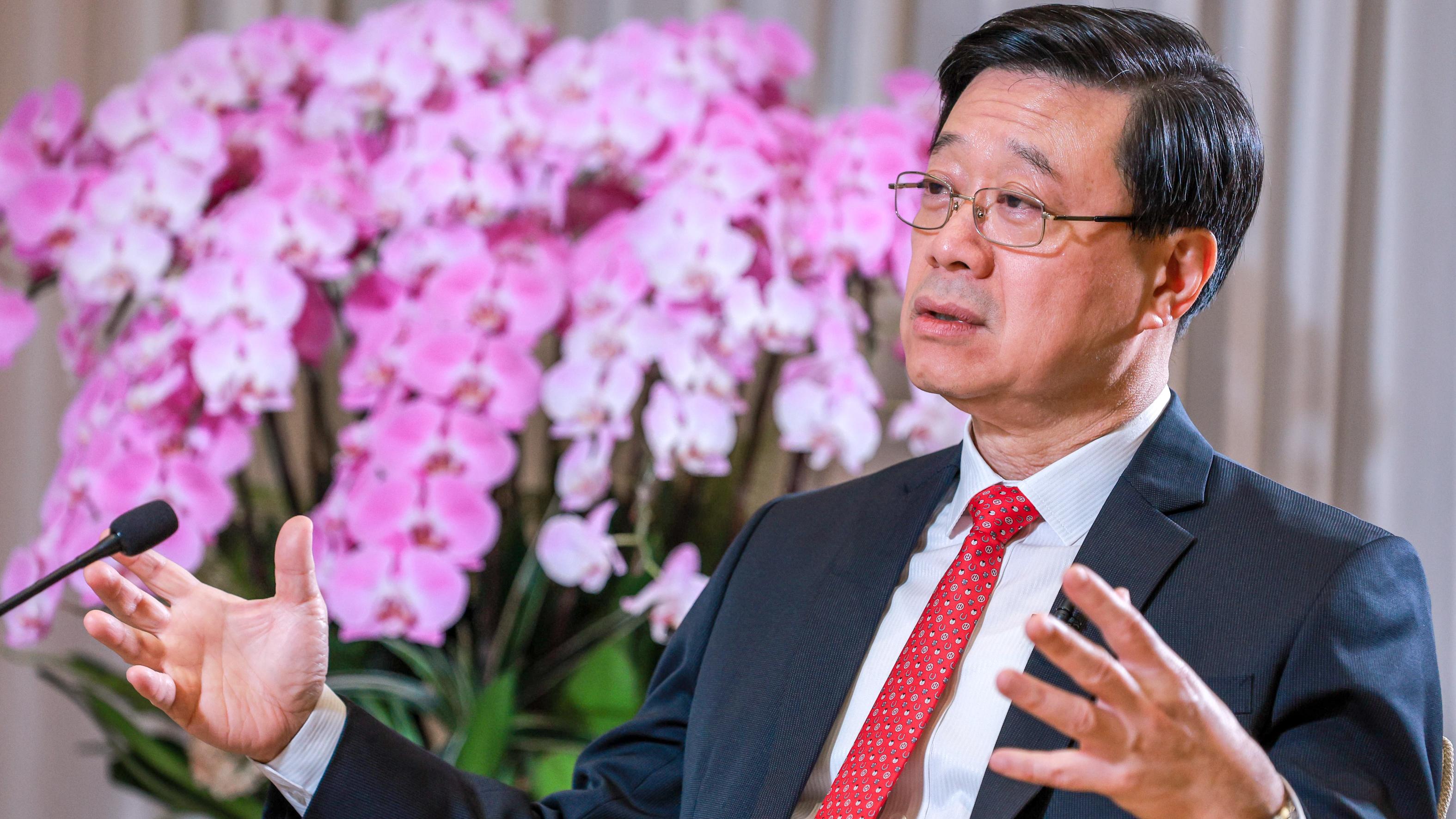 Hong Kong Chief Executive John Lee Ka-Chiu speaks to media outlets in an interview at the Chief Executive's Office in Central, Hong Kong, on June 30, 2023, a day before the 26th anniversary of the city’s return to the motherland. (ANDY CHONG / CHINA DAILY)
Hong Kong Chief Executive John Lee Ka-Chiu speaks to media outlets in an interview at the Chief Executive's Office in Central, Hong Kong, on June 30, 2023, a day before the 26th anniversary of the city’s return to the motherland. (ANDY CHONG / CHINA DAILY)
Hong Kong Chief Executive John Lee Ka-chiu highlighted the need to better promote fresh developments to global communities, sending out invitations for the world to board the Hong Kong express, a united, highly motivated and faster train.
“The goal is to help more people realize that Hong Kong is a place that deserves people to seek development and make investment,” Lee told media outlets in an interview on Friday, a day before the 26th anniversary of the city’s return to the motherland.
READ MORE: Lee urges Chinese mainland enterprises to invest in HK
After Hong Kong fully restored connections with the Chinese mainland and overseas regions this year, Lee has led many officials and industry leaders to nearby mainland cities and some Middle East countries to publicize opportunities in the city.
Any enterprise and talent that join the city’s development will able us to drive forward more strongly. Together, we can reach our destination faster.
John Lee Ka-chiu, Chief Executive, HKSAR
He also plans to visit Association of Southeast Asian Nations member states soon, such as Singapore, Malaysia and Indonesia.
Lee noted that many of Hong Kong’s strengths are not well-known, such as the eight key development areas proposed in the nation’s 14th Five-Year Plan (2021-25), which cover finance, technology, culture and arts, trade, shipping, aviation, legal services, and intellectual property protection.
These are all closely connected with the business activities and investments of overseas enterprises and individuals, Lee said.
As long as it was affected by the COVID-19 pandemic, it was hard for Hong Kong to promote these advantages, Lee said, but as the restrictions were lifted, the right time has come to inform the world about the city’s new strengths, its industrial developments and the change in administration style.
Lee noted that it’s also important to strengthen overseas communities’ understanding of Hong Kong’s gateway role to the market of the Guangdong-Hong Kong-Macao Greater Bay Area and the rest of the mainland.
For instance, the newly launched HKD-RMB Dual Counter Model is a significant innovative approach that can facilitate the use of the renminbi in equity trading in Hong Kong and expand its investable universe, Lee said, adding that some overseas people might not have a clear understanding of the mechanism or its significance.
As a global finance center, Hong Kong has great potential in promoting the circulation of money and attracting investments, Lee added. With Hong Kong’s unique advantages, the Greater Bay Area has also witnessed strong economic growth and its GDP has surpassed that of many countries and regions.
Besides the finance arena, Hong Kong also scored good marks in professional services, internalization, business environment, environmental protection, and the cultural and art atmosphere, Lee said, adding that they all deserve better promotion.
 China Daily's Li Bingcun (left) interviews Chief Executive John Lee Ka-Chiu at the Chief Executive's Office in Central on June 30, 2023. (ANDY CHONG / CHINA DAILY)
China Daily's Li Bingcun (left) interviews Chief Executive John Lee Ka-Chiu at the Chief Executive's Office in Central on June 30, 2023. (ANDY CHONG / CHINA DAILY)
“More importantly, Hong Kong is more united than ever. Any enterprise and talent that join the city’s development will able us to drive forward more strongly. Together, we can reach our destination faster. We welcome you to hop on board Hong Kong’s express train to achieve greater success,” Lee said.
READ MORE: Lee: Hong Kong starts new chapter of digital economy
To increase the development momentum of Hong Kong, the special administrative region government will continue to lure high-end professionals and enterprises to the city, which Lee regards as “the most important element” for development.
In addition to that, the city will also further dovetail with national strategies, such as the 14th Five-Year Plan, the Greater Bay Area blueprint, and the Belt and Road Initiative, to shore up its strengths and supplement its weaknesses, Lee said.
Noting that the National Security Law for Hong Kong has achieved significant results in the past three years, Lee also cautioned about the hidden risks.
Shifting from radical violence to soft confrontations, some disruptors recently intentionally damaged the city’s organ donation register by boycotting the planned organ donation sharing program with the mainland, Lee said.
“It’s part of our obligation to alert the residents that, although the 2019 social unrest is over, there are still potential risks to the development of the city and of ‘one country, two systems’. We must always have plans to counter internal disruptions and external interference,” Lee said.


